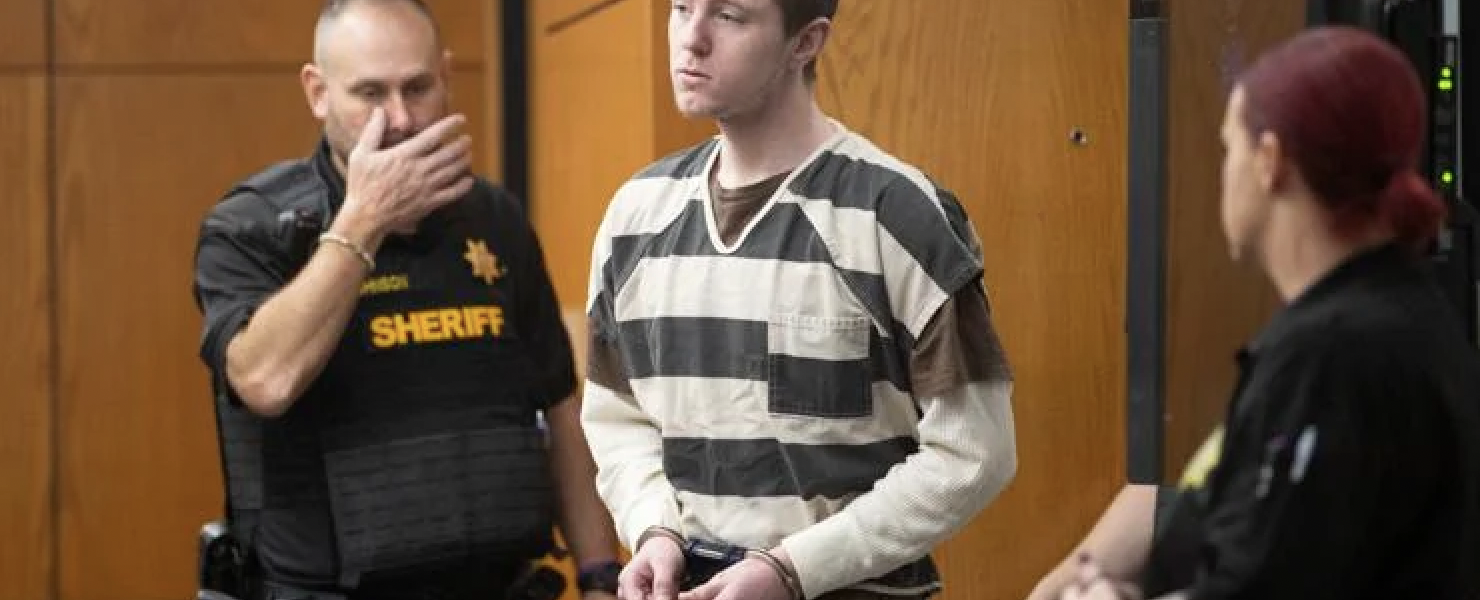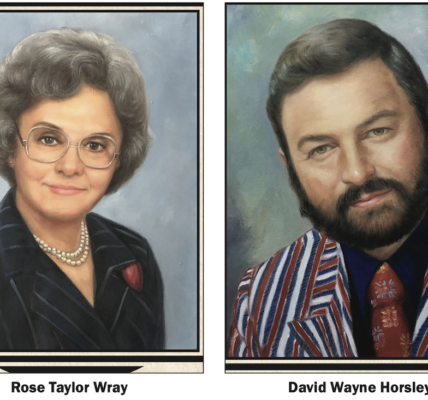
Karn to life in prison for the second-degree murder of Phoenix Cerenil.
Alvte Katilius/Wyoming Tribune Eagle
By Samir Knox
Wyoming Tribune Eagle
Via- Wyoming News Exchange
CHEYENNE — A Cheyenne man who pleaded guilty to second-degree murder for strangling his girlfriend to death was sentenced to life in prison Friday morning.
Charles R. Karn, 19, was sentenced by District Judge Catherine R. Rogers, who gave him a life sentence without any qualifications for minimum prison time.The sentence was more strict than the recommendations made by the assistant district attorney for the case and Karn’s public defender.
“I’m kinda shocked,” Refugio Cerenil, the father of Karn’s victim, Phoenix Cerenil, told the WTE after Friday’s hearing. “I really didn’t think it was going to go that way. I tried not to get my hopes up.”
“I think that that is the best news that we could’ve hoped for,” Kelsea Cerenil, Phoenix’s stepmother, added. “Given the situation, the charges, everything that’s happened. In my opinion, I couldn’t have asked for more.”
Karn was arrested in June after Cerenil was hospitalized. At his arraignment in September, Karn pleaded guilty to a second-degree murder charge in a deal that Public Defender Diane Lozano said she got for him.
At Friday’s sentencing, Karn was handcuffed, and 11 Laramie County Sheriff ’s deputies were present in the courtroom.
When she began the hearing, Rogers asked that all lawyers remain seated at their respective tables “for security purposes.”
She added that she wanted to “minimize movement around the courtroom.” The victim’s relatives were also escorted to the witness stand by a deputy at Rogers’s request.
Karn’s sentencing closed three separate criminal dockets he had opened, with the last and most severe one being the murder of Phoenix Cerenil.
The first docket was for property destruction at the Cheyenne Transitional Center.The second involved a charge of third-degree arson at Kia of Cheyenne.
In the first two dockets, Karn was ultimately sentenced to three to five years of incarceration in both cases, with those sentences imposed consecutively.
Both Kelsea and Refugio Cerenil were able to read prepared victim impact statements at the hearing.
Victim impact statements
In her statement, Kelsea Cerenil said that Karn had a pattern of abuse with Phoenix, which ultimately escalated and resulted in her death.
“How can you tell your kids that everything’s going to be all right when it literally never will be again?” she said, crying on the witness stand with a family member supporting her.
She called the pain of losing a child “a completely different depth of hell,” and described Karn as a “parent’s worst nightmare.”
She concluded her statement by saying that Karn should serve a life sentence and never see a day outside of prison.
When Refugio Cerenil gave his statement, he began by mentioning Karn’s restraints. He said this demonstrated the defendant’s “absolute disrespect for this court and jail system.”
In tears, Refugio Cerenil described Phoenix’s birth.
“(She was) planned and wanted from day one,” he said. “… She was always a blessing to me and my family.”
As Phoenix got older, Refugio Cerenil said that she was diagnosed with Autism Spectrum Disorder and was given an individualized education plan at school.This led to her being bullied and struggling in school, he said. He added that Phoenix had a lower-than-average IQ.
“She was the very definition of a vulnerable adult,” he said.
Phoenix could not fathom someone bringing her harm, he continued, which he said made her murder even crueler.
“In the last moments of her life, she was treated like trash,” Refugio Cerenil said.
He recounted needing to tell his children that Phoenix had died. He told the court that he had to tell them that “absolute evil exists and their sister is gone forever.”
Refugio Cerenil later addressed alleged text messages that he posted on Facebook, where he claims Karn’s family called Phoenix a racial slur for Hispanic people and made other racist remarks.
Karn’s mother interrupted Refugio Cerenil’s statement to assert that she didn’t say any of those things.
Asking for a life sentence, he concluded his statement by saying that he “must have one tiny bit of faith in (his) soul” that Rogers would be the first judge to hold Karn properly accountable.
“(I’m) not sure there are any words of mine that’re going to add to that,” assistant DA Jonah Buckley said, his voice breaking, after Refugio Cerenil returned to his seat.
Emphasizing the severity of the case, Buckley said that Karn’s actions were “offensive to everyone.”
Karn’s defense
Lozano, when addressing the court about the defense’s sentencing concerns, said she would not call Karn’s family to address the court due to his mother’s previous interruption.
She began by saying that she would address the court in an unconventional manner, given the coverage of Karn’s case and his consistent desire to plead guilty.
“My client came to court today expecting a life sentence,” she told Rogers.
She added that Karn let her share the details of personal conversations she’d had with the defendant in order to give the court a better picture of his character.
“I felt that Mr. Karn and I had a connection,” she said.
Throughout her statement, Lozano made no apologies for the defendant’s actions, calling the statement he made during his guilty plea “honest” and “brutal.”
Later, Lozano said she wanted to clarify some confusion surrounding Karn’s second-degree murder plea. She said the defendant always intended to plead guilty to first-degree murder, and, as his defense attorney, she spoke to the state about an agreement to allow him to get a lesser charge in exchange for his willingness to plead guilty so quickly.
She offered to get Karn that agreement as early as his preliminary hearing, she added, but said that Karn wanted to attend that hearing because he did not want to seem like a coward to the Cerenil family.
She pushed back on the idea that the second-degree murder plea was a surprise to the state and said “it shouldn’t have been.” She added this case had the most misinformation and misunderstanding of her career.
The defendant’s history
Lozano continued her statements by saying that Karn had a number of characteristics that should be considered for his sentencing. She cited his age, childhood trauma, reduced mental capacity, acceptance of responsibility, remorse, potential for change and value as a human being when defending him.
She presented details previously not heard in court about Karn’s childhood trauma at the hands of his biological father, going back to when he was 4.
She also said Karn had had two stints at the Wyoming Boys’ School in Worland, which she said took a serious toll on his mental health and may have negatively impacted his ability to improve.
“We have a system that generally works for most kids,” she said, adding that Karn was too “complex” and that the system didn’t work for him.
She continued by saying that, if criminal charges he faced at the Boys’ School had never happened, he might have been able to get treatment, and they would not have been in court that day.
“I guess that makes me sad,” she said.
She also said a psychiatric specialist said Karn likely had a trauma and stress disorder, anxiety, potential obsessive-compulsive disorder, attention-deficit/hyperactivity disorder, a developmental disability and an impulse control disorder that might have contributed to his behavioral problems.
She concluded by saying that Karn’s family believes he has changed and asked for a sentence of 20 years to life with credit for time served, adding that Karn still seemed like a “kid” to her.
“He is but a child,” she said. “He’s a child that’s done horrible things, and he will face the consequences.”
After a brief recess called by Rogers to decide if Karn would share a statement, the defendant gave a speech, restating his guilt and culpability to the court.
“I have a lot of emotions,” he said. “I feel lonely now that I took Phoenix’s life. … I took somebody that had a family. … Phoenix did not deserve what I did to her.”
He said he was sorry but did not ask for forgiveness, and he acknowledged that he was “selfish” and that “saying sorry will never bring her back.”
Judgment
Rogers told Lozano that when determining Karn’s sentence, she did not see many factors that weighed in Karn’s favor.
“While there are mitigating factors,” she said, “in this court’s estimation, they are few.”
Rogers called Karn’s series of offenses, culminating in Phoenix’s murder, an “enduring” crime spree.
“When I review your juvenile history, I conclude that every effort was made,” she said, “to allow you to return to and remain within the community, to receive rehabilitative services in the community. … When I read your (criminal history) … I conclude that you squandered every opportunity.
“… You took her life for no apparent reason, other than that she bit your finger.”
Along with his prison sentences, Karn also had a series of court fees imposed in all of his cases. Lozano requested that Rogers deem Karn unable to pay a total of $4,000 in public defender’s fees across all three dockets, which she granted.
Karn and his defense also have 30 days to appeal the judgment.





